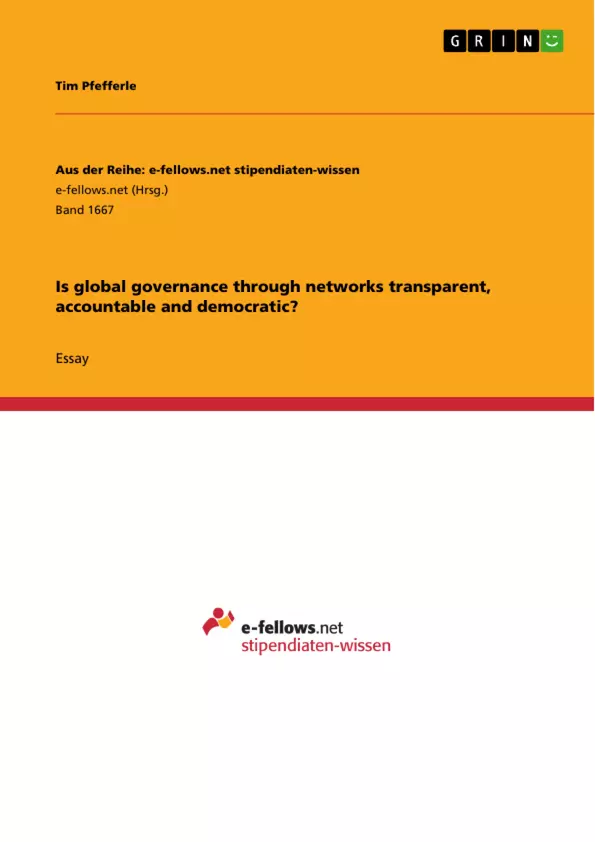Networks have been seen as instruments to manage contemporary global governance. They consist of groups of government officials who exchange information, best practices and regulatory ideas. However, the network paradigm appears problematic. Networks tend to lack transparency, and it is unclear whether they can be hold to account. Most crucially, they do not possess the democratic features necessary to attain the status of participatory instruments for global governance.
Inhaltsverzeichnis (Table of Contents)
- Introduction
- Networked Governance
- Transparency
- Accountability
- Democracy
- Conclusion
Zielsetzung und Themenschwerpunkte (Objectives and Key Themes)
This essay examines the transparency, accountability, and democratic nature of global governance networks. It argues that while networks are valuable tools for policy-making in a globalized world, their inherent structure presents challenges to these core principles. The essay explores the potential for exclusion, opacity, and lack of public engagement within these networks.
- The essay analyzes the role of networks in global governance, highlighting their relevance in a globalized world.
- It examines the challenges of transparency within networked governance, focusing on the potential for information control and secrecy.
- The essay investigates the issue of accountability in networks, examining how power imbalances and the lack of traditional democratic structures can affect accountability.
- It critically assesses the democratic deficit inherent within the networked governance paradigm, arguing that these structures are inherently limited in their capacity to promote democratic processes.
Zusammenfassung der Kapitel (Chapter Summaries)
Introduction
The essay begins by acknowledging the traditional positive view of networks in global politics, linking them to the exchange of ideas and collaborative policymaking. However, it argues that the governance-through-networks paradigm presents normative problems due to its exclusionary nature, opaque structures, and lack of democratic participation.
Networked Governance
This section explores the analytical value of the network paradigm in understanding contemporary global governance structures. It emphasizes the shift towards a more interconnected world and the need for flexible responses to global challenges. The author highlights the distinction between the coercive nature of imperialism and the free exchange model of networked governance, emphasizing the network's ability to optimize responses to globalization-induced problems.
Transparency
The chapter examines the limitations of transparency within networked governance. While acknowledging the potential for information access in a globalized world, the author argues that the sheer volume of information can be manipulated by network members. The lack of equal access and capacity to process information creates an imbalance, leading to opaque decision-making processes, particularly in areas like national security and trade policy.
Accountability
This section delves into the issue of accountability within networked governance. It compares the fragmented but structured accountability mechanisms present in national democracies with the more informal and less transparent nature of network governance. The author argues that the lack of clear accountability mechanisms, particularly outside the realm of democratic politics, diminishes the potential for public scrutiny and oversight.
Democracy
The chapter explores the democratic deficit inherent in the network paradigm. Drawing on the example of the European Union, the author highlights the challenges in reconciling democratic principles with the largely technical and bureaucratic nature of network governance. The lack of a fully-fledged polity at the global level further complicates efforts to establish meaningful democratic participation.
Schlüsselwörter (Keywords)
The key themes and concepts explored in this essay include global governance, networked governance, transparency, accountability, democracy, globalization, information access, power imbalances, and democratic deficit. The author analyzes the complexities of balancing the effectiveness of networks with the need for transparency, accountability, and democratic principles in the context of global governance.
Frequently Asked Questions
What are global governance networks?
Global governance networks consist of groups of government officials who exchange information, best practices, and regulatory ideas to manage international issues.
Why is transparency a problem in networked governance?
Networks often lack transparency because the volume of information can be manipulated by members, and decision-making processes are frequently opaque.
Are governance networks democratic?
The essay argues that networks possess a democratic deficit as they lack traditional democratic structures and public engagement features.
How does accountability work in global networks?
Accountability in networks is often informal and less transparent than in national democracies, making public scrutiny and oversight difficult.
What is the difference between imperialism and networked governance?
Unlike the coercive nature of imperialism, networked governance is based on a model of free exchange aimed at optimizing responses to globalization problems.
- Citar trabajo
- Tim Pfefferle (Autor), 2015, Is global governance through networks transparent, accountable and democratic?, Múnich, GRIN Verlag, https://www.grin.com/document/312460



